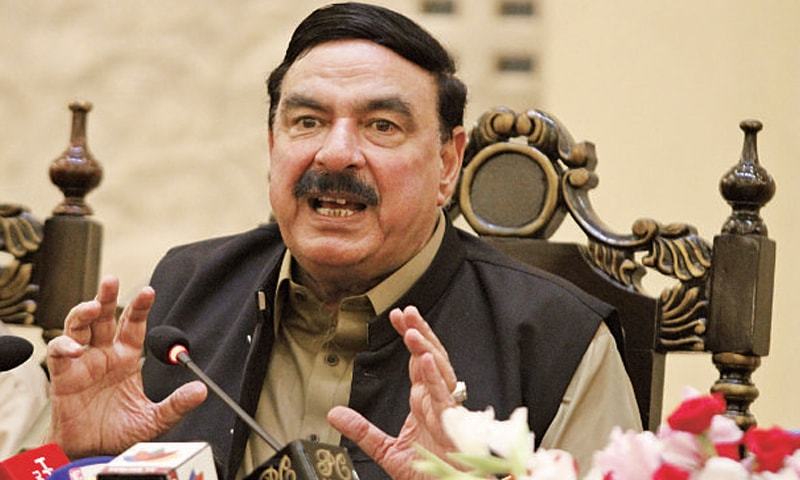As the departure of American and NATO forces from Afghanistan nears completion and the Taliban gain more territory, an inflow of migrants into Pakistan seems to be unavoidable. However, Islamabad does not seem to be in favour of opening its border this time, and instead looks willing to consider the ‘Iranian model’ if the circumstance requires it.
“We have decided not to open our border for refugees; the aid agencies can help the needy on the other side too,” Interior Minister Sheikh Rashid Ahmed said.
“But, if the situation deteriorates, we will establish settlements along the border with strict control and monitoring, prohibiting the entry of refugees into the mainland,” he went on to say.
“The government would even follow the Iranian model to contain refugees in these camps and manage them effectively,” he added.
According to the United Nations High Commission for Refugees (UNHCR), there were approximately 800,000 Afghan refugees in Iran in the 1980s, but they were all forced to live in refugee settlements built up by Tehran near the Afghan border in order to prevent them from settling in cities and towns.
On the other hand, a senior government official revealed that Prime Minister Imran Khan discussed the matter with Iranian President-elect Ebrahim Raisi over the phone on Sunday evening.
While congratulating Mr Raisi on his election win, PM Khan voiced concern about the deteriorating security situation in Afghanistan, saying the consequences might be felt in both Pakistan and Iran.
“During their discussion on Afghanistan, both sides agreed to work on the Iranian model,” the official said, adding that ““it has been decided that a high-level team comprising officials from the interior ministry, security establishment and other relevant departments would visit Iran soon to understand the successful implementation of the model.”
There are two major border crossings between Pakistan and Afghanistan at the moment: Chaman in Balochistan and Torkham in Khyber Pakhtunkhwa, as well as a number of smaller trade stations. The Afghan border has been walled for the most part, making illicit transit impossible.
Saleem Khan, the Chief Commissioner for Afghan Refugees, said the situation on the border was not worrisome at the moment, but that if it worsened, international organisations and donor agencies would notify Islamabad.
Mr Khan said that despite not being a party to the 1951 UN Refugee Convention or the 1967 Refugee Protocol, Pakistan has been a responsible neighbour for more than four decades, hosting over three million Afghan refugees.
“Besides, it is a laudable achievement that there has been no tension between locals and Afghan refugees in Pakistan; all refugees are treated equally in government hospitals and education institutions in Pakistan,” the chief commissioner said.
“There are even international cricket players in Afghanistan who learnt the game in various Pakistani sports academies and centres,” he added.
Saleem Khan believes that a complete strategy should be developed once all stakeholders, including provinces, have been consulted.
Officials from several provinces, including Gilgit-Baltistan, expressed worry over the entry of Afghans in their regions, but refused to be identified.
“Our most serious fear is that the Afghans might add to the strength of sectarian terrorists, who had been subdued by the army,” an elected representative in the Gilgit-Baltistan Assembly said.
A cabinet member in the Sindh government voiced similar sentiments, stating that the majority of migrants will arrive in Karachi, but the city’s municipal facilities were already overburdened, with several districts experiencing peace and order issues.
A senior government official, on the other hand, said that although Pakistan was concerned about the humanitarian problems in the area, particularly Afghanistan, there were many other considerations to consider.
“We have to keep note of our economic and political situation, social aspects and security problems before taking any decision,” the official said, adding that the decision to allow entry of Afghan nationals fleeing the fighting cannot be seen in isolation.
Sources in the security establishment, on the other hand, indicated there were other worries in the present situation.
“Opening of the border could facilitate movement of Pakistanis wanting to support the Taliban either as fighters or in logistics, a security official said.
He used the example of Pakistani women attempting to go to areas in Syria and Iraq controlled by the terrorist Islamic State organisation.
“This leads to the spread of violent religious extremism in the country,” the official said, adding that the security establishment could not overlook the fact that many Afghans arriving would be jobless and could become involved in ultranationalist politics in Balochistan and Khyber Pakhtunkhwa, such as the Pashtun Tahaffuz Movement (PTM).
Meanwhile, UNHCR Pakistan spokesman Qaiser Khan Afridi said that the organisation was in Pakistan to assist the government in the event of an inflow of Afghans.
He said the UNHCR was “observing the situation closely in the region and hoped that peace and stability will be fully achieved in Afghanistan through dialogue”.
Mr Khan said: “A political solution should be favoured instead of conflict, but the risk of further displacement exists and we need to be prepared.”
Around three million Afghan nationals live in Pakistan, with 1.4 million holding a proof of registration card (PR Card), 850,000 holding Afghan citizen cards, and up to half a million unregistered people mainly living in rural regions, performing menial occupations, or working as nomads or herders.










